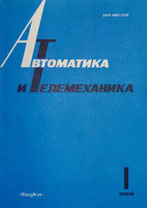|
This article is cited in 4 scientific papers (total in 5 papers)
$\mathcal{L}_1$-optimal filtering of Markov jump processes. I. Exact solution and numerical implementation schemes
A. V. Borisovabc
a Institute of Informatics Problems, Federal Research Center “Computer Science and Control,” Russian Academy of Sciences, Moscow, Russia
b Moscow Aviation Institute (National Research University), Moscow, Russia
c Moscow Center for Fundamental and Applied Mathematics, Moscow State University, Moscow, Russia
Abstract:
Part I of this research work is devoted to the development of a class of numerical solution algorithms for the filtering problem of Markov jump processes by indirect continuous-time observations corrupted by Wiener noises. The expected $\mathcal{L}_1$ norm of the estimation error is chosen as an optimality criterion. The noise intensity depends on the state being estimated. The numerical solution algorithms involve not the original continuous-time observations, but the ones discretized by time. A feature of the proposed algorithms is that they take into account the probability of several jumps in the estimated state on the time interval of discretization. The main results are the statements on the accuracy of the approximate solution of the filtering problem, depending on the number of jumps taken into account for the estimated state, on the discretization step, and on the numerical integration scheme applied. These statements provide a theoretical basis for the subsequent analysis of particular numerical schemes to implement the solution of the filtering problem.
Keywords:
Markov jump process, stable numerical solution algorithm, local and global accuracy of approximation.
Citation:
A. V. Borisov, “$\mathcal{L}_1$-optimal filtering of Markov jump processes. I. Exact solution and numerical implementation schemes”, Avtomat. i Telemekh., 2020, no. 11, 11–31; Autom. Remote Control, 81:11 (2020), 1945–1962
Linking options:
https://www.mathnet.ru/eng/at15590 https://www.mathnet.ru/eng/at/y2020/i11/p11
|

| Statistics & downloads: |
| Abstract page: | 162 | | Full-text PDF : | 29 | | References: | 47 | | First page: | 13 |
|




 Contact us:
Contact us: Terms of Use
Terms of Use
 Registration to the website
Registration to the website Logotypes
Logotypes








 Citation in format
Citation in format 
